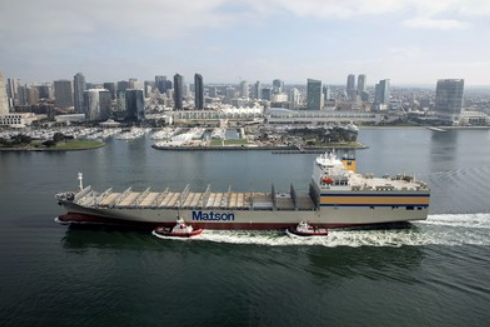Matson Inc., a U.S. cargo carrier in the Pacific, recently took delivery of the 870'x114' Matsonia, the second of two new Kanaloa-class combination container/roll-on, roll-off (Con-Ro) ships built by General Dynamics NASSCO.
The two are the largest vessels of their kind ever built in the U.S., Matson officials said. They join two new containerships, Daniel K Inouye and Kaimana Hila, in completing the renewal of Matson's Hawaii fleet.
Matsonia and sistership Lurline have a deep draft of 38' and weigh in at over 50,000 metric tons. The ships have an enclosed garage with room for approximately 500 vehicles, plus ample space for rolling stock and breakbulk cargo. Lurline entered service in January 2020.
Built by Philly Shipyard, Matson's new Aloha-class containerships, Daniel K. Inouye and Kaimana Hila, entered service in 2018 and 2019, respectively. Each 850' containership has a 3,600 20' equivalent (TEU) capacity. The four new ships are the centerpiece of Matson's nearly $1 billion investment to modernize its Hawaii service.
In addition to a nearly $930 million investment in its fleet, Matson is also investing more than $60 million in improvements to its Hawaii hub terminal at Sand Island in Honolulu, in conjunction with the state of Hawaii's Harbors Modernization plan.
"Putting four new ships into service in a three-year span is a significant accomplishment that culminates eight years of planning, project management and coordination for teams across many departments at Matson," Matt Cox, chairman and chief executive officer for Matson, said in a statement announcing the delivery. "Together with the modernization and expansion of our Honolulu terminal, these investments position Matson to provide efficient, reliable service to Hawaii for decades to come."
Phase 1 of Matson's Sand Island Terminal Modernization project was completed this year, with the installation of three new electrically powered gantry cranes and the upgrading of three existing cranes and the terminal's power system. Phase 2, which will include improvements to the container yard and gate, will begin in 2021. In Phase 3, concurrent with the Hawaii's completion of the new Kapalama Container Terminal, Matson will expand its waterfront and overall terminal footprint by 30% by acquiring adjacent piers 51A and B.
In addition to ensuring efficient, reliable service to Hawaii for the next three decades, Matson's fleet renewal program is also accomplishing a broader fleet modernization that ensures compliance with increasingly stringent global emissions regulations. Designed and built specifically for the Hawaii trade, all four of the new ships feature state-of-the-art green technology, including fuel-efficient hull design, environmentally safe double hull fuel tanks, liquid natural gas (LNG) compatible engines, and freshwater ballast systems. The more recent Kanaloa Class vessels are equipped with the first Tier 3 dual-fuel engines to be deployed in containerships regularly serving West Coast ports. Tier 3 engines reduce the levels of particulate emissions by 40% and nitrogen oxide emissions by 20%, as compared to Tier 2 standards.
The four new ships are also Matson's fastest vessels, with the ability to operate at or above 23 knots, helping ensure on-time deliveries in Hawaii from Matson's three West Coast terminals in Tacoma, Wash., Oakland, Calif., and Long Beach, Calif. Matsonia and Lurline are iconic vessel names in Matson's long history. Matsonia dates to the construction of Matson's first ship of that name in 1912. Three more ships were given the name in subsequent years; the new vessel is the fifth. Lurline dates to the construction of Capt. William Matson's first ship of that name in 1887. Four more ships were given the name in subsequent years; the newest vessel is the sixth.
Daniel K. Inouye was named in honor of the late Hawaii Senator, who was a strong supporter of the U.S. Merchant Marine and a powerful advocate of the maritime industry. Kaimana Hila is a Hawaiian transliteration for Diamond Head, one of Hawaii's most iconic landmarks.




